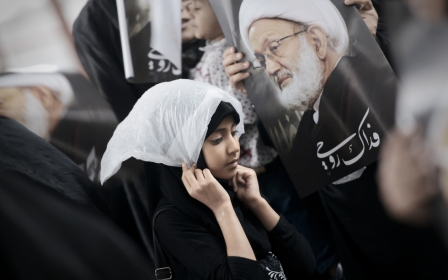Bahrain urged to end prosecution of leading rights activist Nabeel Rajab

Bahrain should stop the prosecution of one of the kingdom’s leading human rights activists, Human Rights Watch said on Sunday.
Nabeel Rajab was arrested on 2 April last year for comments made on Twitter that criticised the Saudi-led coalition’s war in Yemen.
He was released on 13 July last year but was re-arrested on 13 June and is on trial facing 15 years in prison.
The charges against him include “spreading rumours during wartime” and “insulting a statutory body”.
Human Rights Watch said Rajab’s trial demonstrates Bahrain’s lack of respect for human rights.
“Bahrain keeping Nabeel Rajab in a prison cell for criticising abuses shows the ruling Al-Khalifa family’s deep contempt for basic human rights,” Joe Stork, deputy Middle East director, said in a statement.
“States that claim to support peaceful activism should use the Human Rights Council session to demand Rajab’s immediate release.”
Rajab co-founded the Bahrain Centre for Human Rights in 2002 and he is a member of the Middle East advisory committee at Human Rights Watch. He has been imprisoned on numerous occasions on charges relating to his human rights activism by Bahraini authorities.
His trial is set to resume on 5 September and he faces up to 15 years in prison if convicted.
Whilst in prison Rajab has suffered medical problems and has been transferred to hospital on at least one occasion.
His family said in June that he has been suffering from an irregular heartbeat and that Bahraini authorities have been reluctant to allow him access to medical treatment.
"Nabeel never suffered heart problems before," said Sumaya Rajab, Nabeel's wife, in a statement. "My husband is a human rights defender and does not deserve this treatment.”
The New York-based Human Rights Watch also said Bahrain has restricted the movements of rights activists and denied some the right to travel to Geneva to attend sessions of the UN Human Rights Council.
Three of Rajab’s colleagues at the Bahrain Centre for Human Rights (BCHR) have been stopped from leaving the kingdom to attend the Human Rights Council, which is set to start its next session on 13 September.
BCHR’s head of international relations Nedal al-Salman said that on 29 August she was told by authorities she could not leave Bahrain and was placed on a travel ban.
On 22 and 23 August respectively, BCHR staff members Enas Oun and Hussain Radhi were on a travel ban and could not leave the kingdom.
“The member states of the Human Rights Council have an obligation to strongly criticise Bahrain and any other government that persecutes human rights defenders and obstructs the purpose of the UN human rights system,” Stork said.
Bahrain has been in the throes of an uprising since February 2011 when hundreds of thousands of people took to the streets demanding democratic reforms in the authoritarian state ruled by the Khalifa royal family.
Bahraini authorities backed by Saudi Arabia and other Gulf States responded to the protests with force leading to the deaths of scores of protesters.
Since 2011, the kingdom has seen near daily protests calling for the overthrow of the royal family. There has also been numerous attacks on police and security officials, who have locked up many of the kingdom’s protesters and human rights activists.
Middle East Eye propose une couverture et une analyse indépendantes et incomparables du Moyen-Orient, de l’Afrique du Nord et d’autres régions du monde. Pour en savoir plus sur la reprise de ce contenu et les frais qui s’appliquent, veuillez remplir ce formulaire [en anglais]. Pour en savoir plus sur MEE, cliquez ici [en anglais].




